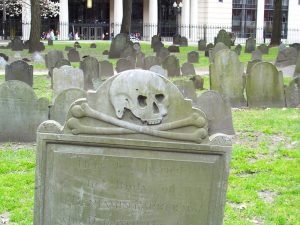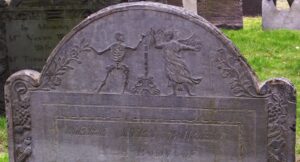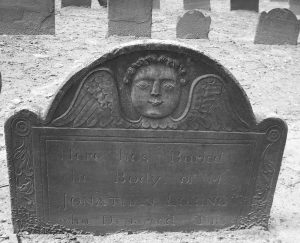Halloween is less than a week away and there is no better time to highlight some tombstone art that conjures up Halloween images.

King’s Chapel Burying Ground, Boston (2009 photo by Karen)
You will not usually see tombstone symbols like these around here. Most of these tombstone photos were taken in Boston cemeteries and the markers date back to the 1600s. Many are carved in slate.
The skull and crossbones symbolize mortal remains. Individuals died and their bones were all that remained. The Puritans had a lot of influence during this time.

Granary Burying Ground, Boston, (2009 photo by Karen)
As time went on the skull image was depicted with a pair of wings and is known as the winged death head. It symbolizes physical death and spiritual regeneration. The winged death head shows the soul fleeing mortality and winging its way to the afterlife. Note the hourglass above the skull, symbolizing the passing of time, the shortness of life, and that time has run out.

Winged Death Head, King’s Chapel Burying Ground, Boston (2009 photo by Karen)
This tombstone shows the Grim Reaper and the Death Angel snuffing out the flame of life. Note the angel figure is holding an hourglass.

Grim Reaper & Death Angel, King’s Chapel Burying Ground, Boston (2009 photo by Karen)
The soul effigy symbol, or winged cherub, appeared in the late 1600s and features a softer face with human features. The soul effigy image represents the soul winging its way to heaven.

Soul Effigy, King’s Chapel Burying Ground, Boston (2009 photo by Karen)
Tombstone art continued to evolve and one of the earliest gravestone carvings in our area was the weeping willow tree, which became popular in the early 1800s.


